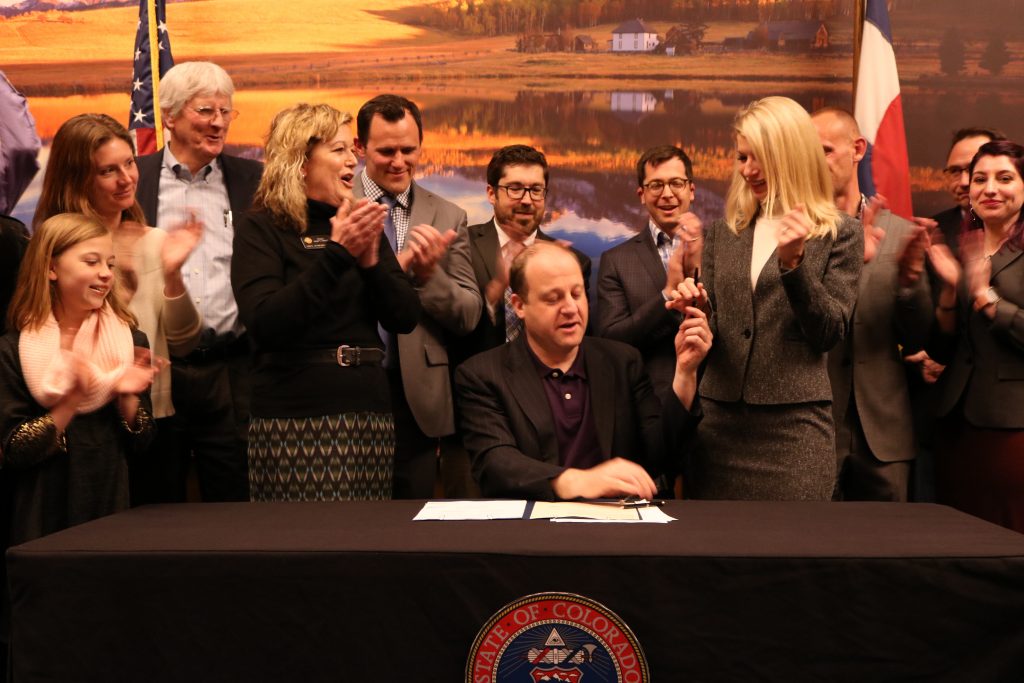With Gov. Polis’ Signature, Saving for Retirement Just Got Easier

The retirement crisis is here. Right now, nearly half of our state’s private sector workers have no retirement plan at work. But research shows these plans are a huge catalyst for saving, as we’re 15 times more likely to save if our contributions are automatically deducted from our paychecks. That’s why retirement savings plans through the workplace have been largely successful.
But the economy is changing. The employer-employee social contract that once stood for stability and security is fraying. This is due to a variety of factors, including contingency work, the gig economy, and other ways of making ends meet. As the economy evolves, many policymakers are rethinking how to provide that security and stability in a new environment, because uncertainty has broad consequences for all of us.
If Colorado wants to continue to thrive in the economy of the future, we need our benefits systems to change alongside the evolution of our jobs. Benefits, and retirement savings plan specifically, need to be offered outside of the contours of employment. This especially critical because we have far too few people with adequate savings.
That’s why the Bell Policy Center has long advocated for Colorado to find new ways to help people save for their retirement. On May 20, Colorado took a major step forward when Gov. Polis signed legislation creating the Colorado Secure Savings Plan Board. The bill (SB19-173) creates a nine-member board chaired by State Treasurer Dave Young and directs it to analyze three approaches to help Coloradans save for retirement. The board will present its recommendations to the legislature in early 2020.
“Advocates on all sides agree Coloradans are not saving enough for retirement. Where they disagree is what to do about it. The board will help us get the facts, assess the options, and take a well-informed approach to solving our retirement savings crisis,” says Scott Wasserman, president of the Bell Policy Center.
The board, appointed by the governor, will be composed of experts in retirement plans, investment management, financial planning, and banking. It will also include representatives of employees, employers, and retired Coloradans. It will conduct detailed market and financial analyses to determine the financial feasibility and effectiveness of three approaches to helping Coloradans save more for their retirement.
One approach that has worked in several states to date is to create a public-private partnership to provide individual retirement accounts (IRAs) to private sector workers without retirement savings plans at work. Known as the Colorado Secure Savings Plan, it would automatically enroll most private sector workers without a plan through their employer in a workplace IRA. Workers would have the option to drop out.
A second approach would create a small business marketplace plan to make it easier and cheaper for small businesses to purchase retirement savings plans for their workers.The Colorado Department of Labor and Employment (CDLE) would certify the quality of plans offered on the exchange by private sector providers and create a website and procedures to make it easier for employers to purchase the plans. The fees charged for the plans would be limited to make them more affordable. This plan would be voluntary, and as findings in Washington state show, would be less likely to successfully help Coloradans save for retirement than other plans.
The third approach would establish a comprehensive financial education program to inform Colorado residents about the importance of saving for retirement and the options available for them to do so. The types of financial education and education providers would be assessed to determine if this approach would increase the amount of Coloradans’ retirement savings and, if so, which type would be most effective.
The board will also conduct a fourth study, assessing the effects on state and local budgets of doing nothing and not increasing the amount of retirement savings in Colorado.
The board will have the ability to contract with outside experts to help assess specific plans, conduct detailed financial analyses, and determine the effectiveness of various approaches.
If the board determines any of the approaches studied would increase private sector workers’ retirement savings in a convenient, low-cost, and portable way that is financially feasible and self-sustaining, it will recommend a detailed plan for implementation.
Expected to be appointed shortly after the bill is signed, the board will meet throughout 2019 and early 2020. It will report its findings by February 28, 2020. (Any plan recommended by the Board can only take effect if the legislature passes legislation authorizing its implementation.)
The Bell applauds the work of the Colorado General Assembly and the state treasurer for taking this critical step toward helping us find a solution to Colorado’s retirement crisis.
